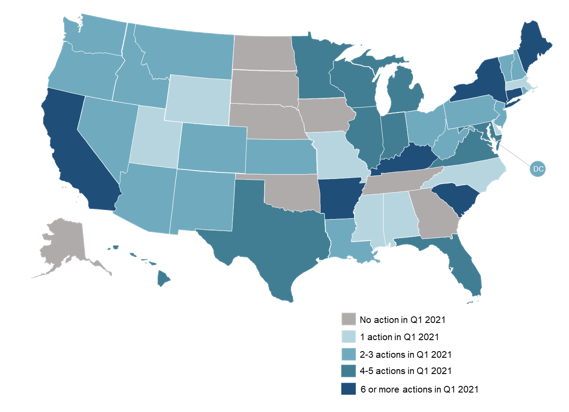The 50 States of Solar: States Consider Over 120 Bills Related to Distributed Solar Policy in Q1 2021
Raleigh, NC – (April 21, 2021) The N.C. Clean Energy Technology Center (NCCETC) released its Q1 2021 edition of The 50 States of Solar. The quarterly series provides insights on state regulatory and legislative discussions and actions on distributed solar policy, with a focus on net metering, distributed solar valuation, community solar, residential fixed charges, residential demand and solar charges, third-party ownership, and utility-led rooftop solar programs.
The report finds that 42 states, plus the District of Columbia, took some type of distributed solar policy action during Q1 2021 (see figure below), with the greatest number of actions continuing to address net metering policies (51), community solar policies (33), and residential fixed charge or minimum bill increases (23). A total of 155 distributed solar policy actions were taken during Q1 2021, with the greatest number of actions taken in South Carolina, California, New York, Maine, and Kentucky.
Q1 2021 Policy Action on Net Metering, Rate Design, and Solar Ownership

The report identifies three trends in solar policy activity taken in Q1 2021: (1) fees based on distributed generation system capacity gaining traction, (2) states revisiting net metering successor tariffs, and (3) states increasing net metering system size limits and aggregate caps.
“While many states continue efforts to develop net metering successor tariffs, some states that have already adopted successor tariffs are revisiting these tariff designs and considering further policy reforms,” noted Autumn Proudlove, lead author of the report and Senior Policy Program Director at NCCETC. “.”
The report notes the top five distributed solar policy actions of Q1 2021:
- Connecticut regulators approving net metering successor tariff designs;
- New Mexico lawmakers enacting community solar legislation;
- California utilities and stakeholder filing Net Metering 3.0 proposals;
- Kansas regulators rejecting Evergy’s proposed distributed generation fees; and
- West Virginia lawmakers passing legislation authorizing third-party solar power purchase agreements.
“After the pandemic threw most of the 2020 legislative sessions into chaos, lawmakers have returned with a renewed interest in solar, introducing close to 120 bills that could affect the continued growth of distributed solar,” observed Brian Lips, Senior Policy Project Manager at NCCETC.
View the 50 States of Solar 2021 Q1 Update Executive Summary
View and Purchase the 50 States of Solar 2021 Q1 Update FULL Report
View other 50 States Reports – Solar, Grid Modernization and Electric Vehicles
ABOUT THE N.C. CLEAN ENERGY TECHNOLOGY CENTER
The N.C. Clean Energy Technology Center, as part of the College of Engineering at North Carolina State University, advances a sustainable energy economy by educating, demonstrating and providing support for clean energy technologies, practices and policies. It serves as a resource for innovative, sustainable energy technologies through technology demonstration, technical assistance, outreach and training. For more information about the Center, visit: http://www.nccleantech.